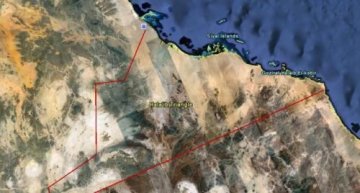Egypt asserts sovereignty over disputed Halayeb region
April 18, 2016 (KHARTOUM) – Egyptian government on Sunday has refused a request from Sudan to engage in direct talks or resort to international arbitration on the dispute between the two countries over Halayeb triangle.

The area has been under Cairo’s full military control since the mid-1990’s following a Sudanese backed attempt on former Egyptian president Mohamed Hosni Mubarak’s life. Egypt brushed aside Sudan’s repeated calls for referring the dispute to international arbitration.
In a statement issued Sunday, Sudan’s foreign ministry said it has closely followed the agreement signed between Egypt and Saudi Arabia on the Teran and Snafir islands, saying they wanted to ensure that the deal doesn’t affect Sudan’s political, historical and legal rights in Halayeb and Shalateen areas and their nearby shores.
On 9 April 2016, the Egyptian government declared that Tiran and Sanafir Islands fall within the territorial waters of Saudi Arabia, as codified in the maritime border agreement signed with the government of Saudi Arabia on the previous day. The agreement needs to be ratified by Egypt’s Parliament.
The Sudanese foreign ministry further called on Egypt to engage in direct negotiations to resolve this issue in the same way as it did with Saudi Arabia or resort to international arbitration as is has done in the dispute with Israel over Taba area.
However, Egypt’s foreign ministry spokesperson Ahmed Abu Zaid Sunday said that “Halayeb and Shalateen are Egyptian territory and they fall under Egyptian sovereignty and Egypt has no additional comment on the statement issued by the Sudanese foreign ministry”.
During his meeting with several Egyptian politicians and diplomats in Cairo last January, the Sudanese foreign minister Ibrahim Ghanodur said the dispute over Halayeb area can’t be resolved by “imposing a fait accompli” but through dialogue or by referring the case to the concerned international institutions.
(ST)
